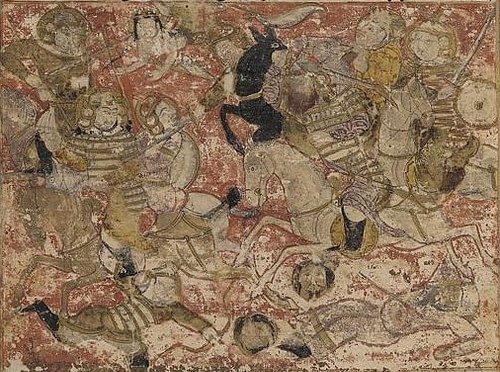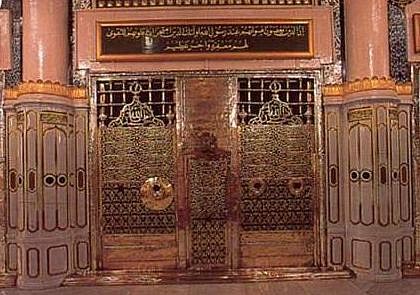
Uthman ibn Affan (l. 576/583-656 CE) was an early convert to Islam, a close friend and son-in-law of Prophet Muhammad (l. 570-632 CE), and the third caliph (r. 644-656 CE) of the Rashidun Caliphate (632-661 CE). His charitable acts and modesty earned him prominence in the early Islamic community, and he was among the favorite and most loyal companions of Prophet Muhammad. Lacking the political strength of his predecessors, he was puppeteered by his kinsmen from the Banu Umayya clan (who later rose to the caliphal seat as the Umayyad Dynasty) throughout his tenure. This stirred resistance against his rule, which climaxed in an open rebellion and culminated in his murder in 656 CE. His death created a rift in the Islamic Empire, the effects of which can be seen even in the present time.
Early Life & Conversion
Uthman was born in 576/583 CE in Taif, a resort Arabian town in the Hejaz region, to Affan ibn Abi al-As, a successful merchant and a wealthy man. Uthman was well educated and soon found himself in his father's position who had passed away, making him one of the richest men in Mecca. When the Islamic Prophet declared his mission, a mutual friend, Abu Bakr (l. 573-634 CE) persuaded Uthman to accept Islam in 611 CE, making him the first of the Meccan patricians to do so.
Uthman was ostentatiously pious and soon became renowned for his dedication to Islam, his charitable acts were especially pronounced within the nascent Islamic community in Medina, after the Hegira (migration from Mecca to Medina, 622 CE), and earned him the nickname of Ghani (the generous). According to one famous legend, he purchased a well and allowed people to draw water from it for free. Yet he tended to favor his kinsmen, which became a problem later on.
Being the first Muslim of noble birth, he was befriended by the Prophet. The relation was cemented when Muhammad made Uthman his son-in-law in 615 CE by the virtue of his daughter Ruqayyah (l. c. 601-624 CE). The couple had one son, who died at the age of six. Ruqayyah fell ill in 624 CE, at the time when the Muslims fought their first battle against the Meccans at Badr. Uthman, who had stayed back at home, caring for his wife, did not join the army for battle, but as fate would have it, Ruqayyah passed away. Later that year, he was married to another daughter of the Prophet, namely Kulthum (l. c. 603-630 CE); this marriage was childless and ended with her death in 630 CE. For his matrimonial bondage with two of Prophet Muhammad's daughters, he was given the title of Dhu al-Nurayn (The Possessor of Two Lights).
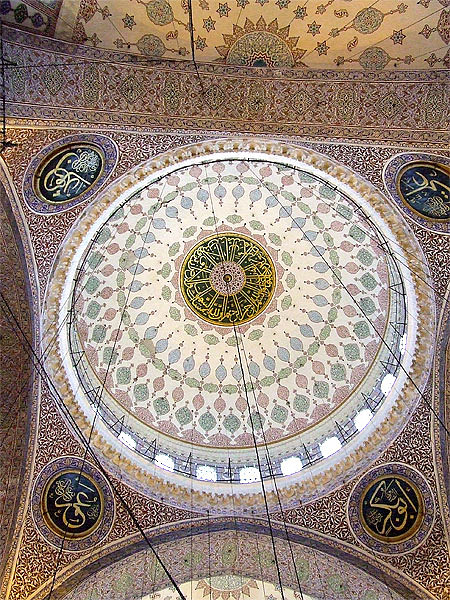
Rise to Power
The Islamic community was shaken after the death of its patriarch, Prophet Muhammad, who succumbed to his illness in 632 CE. It was Abu Bakr, one of his closest associates, who led the society as the first Caliph of Islam. Many tribes who had seceded from the community, were brought back under the canopy of Islam in the wake of the Ridda Wars or the Wars of Apostasy (632-633 CE), as they later came to be known. Once in control of the realm, Abu Bakr launched invasions into Syria and Iraq, but before he could do more, he died in 634 CE.
Those who supported Abu Bakr's claim to leadership formed a group within the Muslim community, known as the Sunni Muslims; a rival group supported the claim of Ali ibn Abi Talib (l. 601-661 CE) – a cousin and son-in-law of the Prophet, they came to be known as Shia Muslims. Adherents of the first group support the claim of all four caliphs of the Rashidun era (Abu Bakr, Umar, Uthman, and Ali), while the second group only holds Ali as the legitimate heir of the Prophet and the first spiritual leader or imam of the community.
Umar ibn al-Khattab (r. 634-644 CE), who had been a vehement supporter of Abu Bakr, was nominated as the second Caliph by the latter in his will dictated to Uthman. Both Uthman and Ali served as advisors to the Caliph, during his ten-year-tenure which witnessed the blossoming of the Islamic Empire. His reign was marked with the exponential growth of the empire's size and power. Administration, law and order, military, public welfare, and pretty much everything else were formalized under his patronage. Caliph Umar was murdered in 644 CE by a Persian slave who wished to avenge the defeat of the Sassanian Empire. In his dying moments, the Caliph nominated a shura (council) of six members to appoint his heir.
The shura narrowed down their choices to Ali and Uthman; the latter was nominated in the end. In his mid-60s, he took the scepter, becoming the third, and the longest-reigning, of the Rashidun Caliphs. His kinsmen, the Umayyads, who had risen through the ranks in the empire under his two predecessors, acquired unprecedented prestige under him, as he heavily relied upon their expertise.
Domestic Policies
Upon assuming power, Uthman increased, by a quarter, the general allowance for people (originally introduced by Umar). He also permitted people to draw loans from the state treasury, which had been hitherto prohibited, on the pretext of supporting business and trade growth. Although he never drew any salary from the state treasury, he did accept gifts from various quarters and allowed his subordinates to do the same. Such leniency was in stark contrast to Umar's strict policies, and it was because of such light-headedness that his governors, who he had appointed based on tribal association to control effectively, became corrupt and started operating autonomously, even repressively.
Another reversal of Umar's policy is attributed to him, this one was perhaps the most destructive of all. Hitherto, the lands of the conquered people were officially recognized as their property and could not be bought by the Arabs. This status quo was meant to safeguard the rights of these people and to prevent the demoralization of the conquering armies. This reversal allowed the Umayyads, who had vast fortunes, to acquire more and more land, giving them more authority than before. His intentions are unclear, but the outcome was destructive.
Standardization of the Quranic Text
Uthman's greatest legacy is the way the Quran, the Holy Scripture of Islam, is read today. The first Caliph, Abu Bakr took a momentous step in compiling the Quran, while ensuring that the text was not tampered. However, Uthman noticed that as the realm expanded and more people entered the circle of Islam, the Quran was being recited in multiple dialects. This slight peculiarity might not have seemed significant to most but Uthman realized that the use of different dialects might lead to misinterpretation of the text.
He ordered the text to be standardized in accordance with Abu Bakr's copy, the task was assigned to Zayd ibn Thabit (l. c. 610-660 CE), one of Prophet's scribes and the man chosen by Abu Bakr in his original project. After completion of the standardization, all unauthorized copies were destroyed. This ingenious move, driven by the care for his faith, was twisted into an accusation of blasphemy by his enemies, but he was redeemed of this blame after his death.
Military Expeditions
Military commanders, who had previously acted in accordance with the Caliph's decisions, started operating independently under Uthman, pushing the borders of the empire farther on their own accord. Employing the talents of the native Syrians, the Muslims took to naval warfare. A Byzantine fleet attempting to retake Alexandria was beaten back in 646 CE. Cyprus fell in 649 CE, followed by Rhodes in 654 CE; Byzantine counter-offensive to this expansion was crushed in 655 CE, in what was later termed as the Battle of the Masts.
Arab domination over the lucrative waters of the Mediterranean was uncontested, and their raiding parties sailed as far as Crete and Sicily. The local Christians (mostly Copts, Monophysites, and Jacobites), who had been oppressed and persecuted by the Byzantines, felt no compunction in assisting their new Muslim overlords in their struggle against the Byzantine Empire.
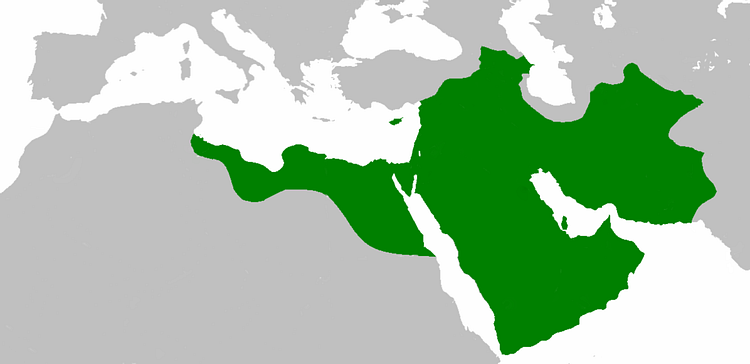
Uthman's military successes were outstanding in all ways but one: financially. Umar's expansionist policy, despite his cautious policy, had brought heaps of war booty; the same, unfortunately, was not true for these conquests. Uthman's military expeditions failed to match the numbers required to keep the state flourishing.
Rebellion against the Caliph
Allegations of nepotism against him were rampant throughout the empire and his quarrels with some leading companions of the Prophet also scandalized the people. His reputation was furthered tarnished by false accusations of blasphemy. However, the final nail in the coffin was struck by the sheer cost of running an empire: lower stipends for an ever-expanding army, poor trade, skyrocketing inflation, and other socio-economic issues simply proved to be too much.
In these challenging times, Uthman found another enemy: Amr ibn al-As (l. c. 573-664 CE), the conqueror and governor of Egypt, whom he had dismissed over his incompetent and corrupt nature; the latter stirred up opposition against the Caliph, especially within Egypt. With so many forces at work against him, the underground resentment, buried in the garrison cities, erupted and standards of rebellion were raised first in Fustat, Egypt, and then in the Iraqi cities of Kufa and Basra. The renegades, numbering in thousands, marched on to Medina, his capital, and Uthman's attempts to address the problems were in vain.
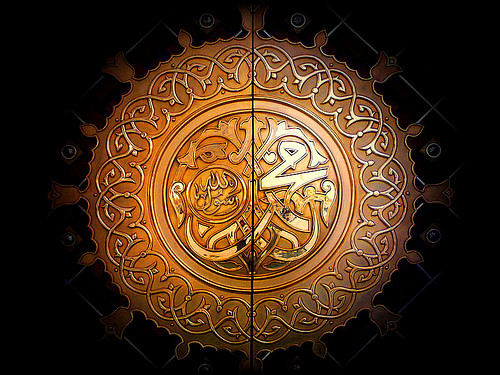
The renegades left at first but soon returned claiming that they had intercepted a letter to Fustat which instructed the city's governor to execute the men upon their return. The shocked Caliph swore that it was forged, but the men were unconvinced. Uthman's assistant, Marwan ibn Hakkam (l. c. 623/626-685 CE, later Marwan I of the Umayyad Caliphate), who had a reputation for dishonesty and had convinced Uthman to make several bad decisions, is the most culpable individual in this debacle and may have done so to have Uthman killed. When Uthman was asked to step down from the caliphal seat, he said that he would not let go of what God had given him, and having said that he went inside his house.
Death & Aftermath
The rebels had resolved on killing him and upon finding the front entrance to his house guarded, they climbed in from the back wall. They found the old caliph reading the Quran and struck him down. Uthman's wife Naila valiantly rushed to protect her husband and shielded him with her bare hands, only to have many of her fingers cut. As Uthman's blood flowed over the Holy Scripture and his body lay lifeless upon the floor, one of the assailants raised his sword to decapitate his body, at the sight of which his wives (two of whom were with him at that time) threw themselves on their dead husband and wailed. Unable to do anything else, the rebels looted his house and even snatched the women's veils on their way out.
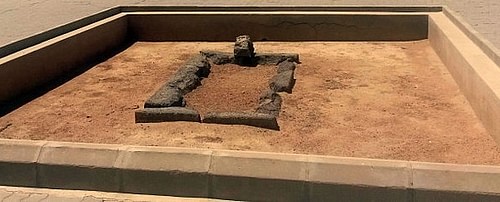
Conclusion
Uthman's charitable acts inspired many within the community, as evident by the masses who flocked under the banner of Muawiya to avenge his death. However, despite his many amiable qualities, he could not rise to the challenge of leadership. His nepotism combined with rash decisions, unreasonable leniency, and gullible nature haunted him throughout his tenure. Sunni and Shia sources paint very different pictures of his character; the reality, as in most cases, must lie in between the two extremes: Uthman, though ostentatiously pious was indeed prone to nepotism.
